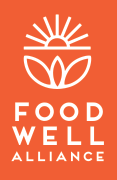Metro Atlanta Cities Receive $10,000 Grants To Support Urban Agriculture
/Food Well Alliance leads a Community Food Forum in Hapeville, Ga. (Photo: Tabia Lisenbee Parker-Food Well Alliance)
In October, 2018, Food Well Alliance launched an initiative to create City Agriculture Plans for every city in Fulton, DeKalb, Gwinnett, Cobb, and Clayton counties through a partnership with Atlanta Regional Commission (ARC). Seven cities applied and we held local Food Forums to find out what was happening on the ground in each city during spring of 2019. After six months of forums, site visits, and internal deliberation, the City of East Point was chosen to pilot City Agriculture Planning with ARC.
With East Point well underway in their planning, Food Well Alliance wanted to support the incredible work happening in the other cities that applied. To catalyze their work in urban agriculture, Food Well Alliance offered a $10,000 Opportunity Grant to cities that were not selected. Four cities received grants: Alpharetta, Pine Lake, Hapeville, and Lawrenceville.
Alpharetta
The City of Alpharetta used their grant for deer fencing at the Alpharetta Farm at Old Rucker Park -- an educational farm providing food, classes, and a creative learning space for the community. Thanks to a new 10’ perimeter fence, the Alpharetta Farm at Old Rucker Park now feels like a wide-open space full of possibility. Previously, each area of the farm - the educational production field, community garden, orchard, and vineyard - was enclosed by plastic fence netting to prevent deer intrusion. This single perimeter fence eliminates the need for that and makes the farm one cohesive space. It has also allowed for increasing community garden plots from 20 to 36, planting fruit bearing bushes, and installing irrigation.
The next projects include the construction of a cut flower garden area, a 3-part compost system and a chicken coop. The grant funds were combined with $5,000 raised by the community through the City’s Community Agriculture Program’s annual membership drive, and then matched by the City of Alpharetta.
Pine Lake
The City of Pine Lake used their grant for installation of a teaching garden adjacent to the lake, in the epicenter of town. The garden will further the mission of local non-profit, the Stewards of Environmental Education and Design (SEED), while transforming public land into a useful and productive space for all who visit. The garden will contain herbs and native trees and be a central location within Pine Lake to weave a story of food and community across the city.
Hapeville
The City of Hapeville used their grant to dedicate a space within the Tom E. Morris Sports Complex for local food advocates to join together and grow food for the community. The space will host a year-round edible garden with community beds, fruit-bearing trees and bushes open to community harvest, as well as farm stands for locally grown produce. The site will be maintained through a collaborative public-private partnership with the Azalea Park and Northwoods Neighborhood Associations to ensure it’s long-term viability. Funds from Food Well Alliance will provide for infrastructure installation and planting at the garden.
Lawrenceville
The City of Lawrenceville used their grant for the Lawrenceville Community Garden at the Lawrenceville Senior Center at Rhodes Jordan Park, operated by Gwinnett’s Health and Human Services Division. The garden will be the first initiative of Live Healthy Gwinnett focusing on food insecure seniors and community needs. Produce grown in the garden will supplement meals for the senior center and home delivered meal clients and supply cooperative partner sites such as food ministries and community pantries.
We appreciate the support and dedication for city agriculture from these cities. Thanks to their incredible teams, visions, and residents who are excited about the work, metro Atlanta is poised to be a leader in local agriculture. To learn more about how Food Well Alliance supports municipal agriculture, visit https://www.foodwellalliance.org/start-a-plan-for-all-well-being




